| Listing 1 - 10 of 15 | << page >> |
Sort by
|
Book
ISBN: 8477866236 Year: 1999 Publisher: Cádiz Universidad de Cádiz
Abstract | Keywords | Export | Availability | Bookmark
 Loading...
Loading...Choose an application
- Reference Manager
- EndNote
- RefWorks (Direct export to RefWorks)
Lexicology. Semantics --- Spanish language --- Espagnol (Langue) --- Polysemy. --- Homonyms. --- Polysémie --- Homonymes --- #KVHA:Semantiek; Spaans --- Polysémie --- Español --- Semántica. --- Lexicografía.
Book
ISBN: 9517651678 9789517651677 Year: 2004 Publisher: Åbo Åbo akademi university press
Abstract | Keywords | Export | Availability | Bookmark
 Loading...
Loading...Choose an application
- Reference Manager
- EndNote
- RefWorks (Direct export to RefWorks)
Coup (The French word) --- French language --- Français (Langue) --- Polysemy. --- Polysémie --- Polysemy --- Français (Langue) --- Polysémie --- Langue d'oïl --- Romance languages --- Etymology --- French language - Polysemy

ISBN: 2020217953 9782020217958 Year: 1999 Publisher: [Paris] : Editions du Seuil,
Abstract | Keywords | Export | Availability | Bookmark
 Loading...
Loading...Choose an application
- Reference Manager
- EndNote
- RefWorks (Direct export to RefWorks)
Act (Philosophy) --- Reaction (Philosophy) --- Language and languages --- Movement (Philosophy) --- Philosophy. --- Mouvement (philosophie). --- Philosophie de l'action. --- Philosophie du langage. --- Réaction (philosophie). --- Sciences --- Polysémie. --- Histoire.
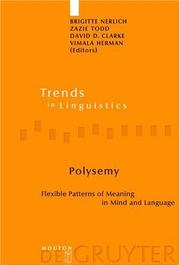
ISBN: 3110176165 3110895692 Year: 2003 Volume: 142 Publisher: Berlin Mouton de Gruyter
Abstract | Keywords | Export | Availability | Bookmark
 Loading...
Loading...Choose an application
- Reference Manager
- EndNote
- RefWorks (Direct export to RefWorks)
About fifty years ago, Stephen Ullmann wrote that polysemy is 'the pivot of semantic analysis'. Fifty years on, polysemy has become one of the hottest topics in linguistics and in the cognitive sciences at large. The book deals with the topic from a wide variety of viewpoints. The cognitive approach is supplemented and supported by diachronic, psycholinguistic, developmental, comparative, and computational perspectives. The chapters, written by some of the most eminent specialists in the field, are all underpinned by detailed discussions of methodology and theory.
Lexicology. Semantics --- Psycholinguistics --- Polysemy. --- Polysemy --- Polysémie --- Semantics. --- Formal semantics --- Semasiology --- Semiology (Semantics) --- Comparative linguistics --- Information theory --- Language and languages --- Lexicology --- Meaning (Psychology) --- Semantics
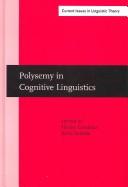
ISBN: 128317457X 9786613174574 9027283699 9789027283696 1556198949 9781556198946 9027236836 9789027236838 Year: 2001 Volume: 177 Publisher: Amsterdam Benjamins
Abstract | Keywords | Export | Availability | Bookmark
 Loading...
Loading...Choose an application
- Reference Manager
- EndNote
- RefWorks (Direct export to RefWorks)
In Cognitive Linguistics, polysemy is regarded as a categorizing phenomenon; i.e., related meanings of words form categories centering around a prototype and bearing family resemblance relations to one another. Under this polysemy = categorization view, the scope of investigation has been gradually broadened from categories in the lexical and lexico-grammatical domain to morphological, syntactic, and phonological categories. The papers in this volume illustrate the importance of polysemy in describing these various categories. A first set of papers analyzes the polysemy of such lexical categories as prepositions and scalar particles, and looks at the import of polysemy in frame-based dictionary definitions. A second set shows that noun classes, case, and locative prefixes constitute meaningful and polysemous categories. Three papers, then, pay attention to polysemy from a psychological perspective, looking for psychological evidence of polysemy in lexical categories.
Polysemy --- Cognitive grammar --- Semantics --- Academic collection --- #KVHA:Semantiek --- Polysémie --- Grammaire cognitive --- Congresses. --- Congresses --- Congrès --- Lexicology. Semantics --- Polysemy - Congresses. --- Cognitive grammar - Congresses.
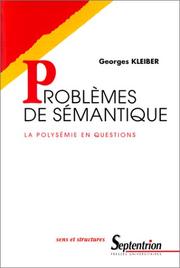
ISBN: 2859395814 2757434586 9782859395810 Year: 1999 Publisher: Villeneuve d'Ascq Presses universitaires du Septentrion
Abstract | Keywords | Export | Availability | Bookmark
 Loading...
Loading...Choose an application
- Reference Manager
- EndNote
- RefWorks (Direct export to RefWorks)
Problèmes de sémantique n’a pas pour objectif de mettre sur pied une nouvelle et xième théorie sémantique, mais celui d’examiner le bouleversement qui a changé fortement le paysage de la sémantique actuelle et d’essayer ainsi de juger à leur juste valeur les hypothèses nouvelles qui portent le développement de la sémantique et surtout bouleversent le traitement de la polysémie aujourd’hui. Trois idées-force animent cette démarche (i) la sémantique n’a aucun sens si elle n’est pas tournée vers (ce que nous croyons être) la réalité. L’ouvrage se place ainsi résolument dans un cadre réaliste, positiviste, qui entend mettre en rapport les formes linguistiques et les aspects pertinents des situations extra-linguistiques qui les sous-tendent. (ii) cette sémantique est résolument ouverte au cognitif en ce qu’elle s’ancre dans l’expérience humaine sous toutes ses dimensions interactives : perceptuelle, sociale, culturelle, etc. (III) elle maintient une place au sens "linguistique", conçu comme un phénomène intersubjectivement stable, dans l’interprétation globale d’un énoncé. Par là-même, une réponse attrayante et instructive est apportée à deux questions cruciales pour la saisie et l’analyse de la polysémie : jusqu’où faut-il l’étendre et à quel niveau de généralité faut-il la traiter ?
Lexicology. Semantics --- Semantics --- Polysemy --- Sémantique --- Polysémie --- Semantics. --- Polysemy. --- Formal semantics --- Semasiology --- Semiology (Semantics) --- Comparative linguistics --- Information theory --- Language and languages --- Lexicology --- Meaning (Psychology) --- Sémantique --- Polysémie --- sémantique --- sens --- français --- problème
Book
ISBN: 9042914165 2877237729 Year: 2003 Volume: 5 Publisher: Louvain Peeters
Abstract | Keywords | Export | Availability | Bookmark
 Loading...
Loading...Choose an application
- Reference Manager
- EndNote
- RefWorks (Direct export to RefWorks)
African languages --- Comparative linguistics --- Grammar --- Grammar, Comparative and general --- Typology (Linguistics) --- Categorization (Linguistics) --- Polysemy. --- Grammaticalisation --- Typologie (Linguistique) --- Catégorisation (Linguistique) --- Polysémie --- Grammaticalization --- Africa --- Afrique --- Languages --- Langues --- Grammaire --- Catégorisation (Linguistique) --- Polysémie --- Syntax
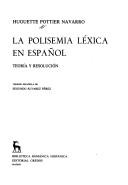
ISBN: 842491449X 9788424914493 Year: 1991 Volume: 374 Publisher: Madrid Gredos
Abstract | Keywords | Export | Availability | Bookmark
 Loading...
Loading...Choose an application
- Reference Manager
- EndNote
- RefWorks (Direct export to RefWorks)
Lexicology. Semantics --- Spanish language --- Espagnol (Langue) --- Homonyms. --- Polysemy. --- Homonymes --- Polysémie --- -Spanish language --- -Castilian language --- Romance languages --- Homonyms --- Polysemy --- -Homonyms --- Polysémie --- Castilian language --- Spanish language - Homonyms. --- Spanish language - Polysemy. --- LINGUISTIQUE ESPAGNOLE --- LEXICOLOGIE --- POLYSEMIE
Book
ISBN: 9783110281187 311028118X 1299719953 3110281244 9783110281248 Year: 2012 Volume: 374 Publisher: Berlin de Gruyter
Abstract | Keywords | Export | Availability | Bookmark
 Loading...
Loading...Choose an application
- Reference Manager
- EndNote
- RefWorks (Direct export to RefWorks)
Los marcadores del discurso suelen ser analizados en relación con sus funciones discursivas. La motivación genética que parte de la palabra base pasa a un segundo plano. Solo las publicaciones más recientes empiezan a ocuparse de la polisemia y polifuncionalidad. Se alude a menudo a la polifuncionalidad, pero no existe ninguna teorización sistemática del concepto. Situaremos la polifuncionalidad en el marco de las relaciones motivadas que provienen de la clase de palabras o de la función sintáctica ocupadas de la unidad base. Esta definición corre pareja con la de la polisemia fundamentada en el significado conceptual de la unidad base. Se pondrá de manifiesto que la polifuncionalidad impulsa la polisemia. A partir de esta doble base motivada se enfocan las estrategias retóricas que subyacen a las funciones discursivas que, a su vez, serán analizadas en el marco de la teoría de la gramaticalización. Se explora un corpus del español semi-informal hablado por empleadas domésticas en Santiago de Chile. El punto de referencia general del análisis es la relación de los datos con las tradiciones oral y escrita.
Multilingualism. --- Polysemy. --- Grammar, Comparative and general. --- Spanish language --- Multilinguisme --- Polysémie --- Grammaire comparée et générale --- Espagnol (Langue) --- Grammar. --- Grammaire --- Discourse markers --- Discourse analysis --- Semantics, Historical. --- Typology (Linguistics). --- Languages & Literatures --- Romance Languages --- Discourse analysis. --- Polysémie --- Grammaire comparée et générale --- Discourse connectives --- Discourse particles --- Pragmatic markers --- Pragmatic particles --- Pragmatics --- Spanish language - Discourse analysis --- Discourse Markers. --- Grammaticalization. --- Sentence Adverbs. --- Spanish.
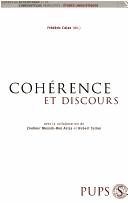
ISBN: 9782840504139 2840504138 9782840502821 2840502828 Year: 2005 Publisher: Paris Presses de l'Université de Paris-Sorbonne
Abstract | Keywords | Export | Availability | Bookmark
 Loading...
Loading...Choose an application
- Reference Manager
- EndNote
- RefWorks (Direct export to RefWorks)
Stylistics --- Discourse analysis --- Cohesion (Linguistics) --- Sociolinguistics --- French language --- Cohérence discursive. --- Français (Langue) --- Sociolinguistique --- Discourse analysis. --- Analyse du discours. --- Polysémie --- Polysémie --- 804.0-3 --- 804.0-3 Frans: lexicografie --- Frans: lexicografie --- Lexicology. Semantics --- Polysemy --- Congresses --- Congrès --- Congresses. --- Analyse du discours --- Stylistique --- Cohérence discursive. --- Français (Langue)
| Listing 1 - 10 of 15 | << page >> |
Sort by
|

 Search
Search Feedback
Feedback About UniCat
About UniCat  Help
Help News
News